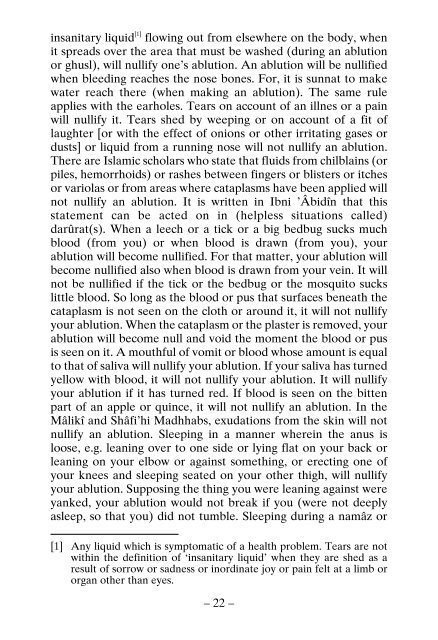O Son !
THE BOOK ‘O SON’ Al-hamdu lillâhi Rabbil ’âlamîn. Wa-s-salâtu wa-s-salâmu ’alâ Rasûlinâ Muhammadin wa Âlihi wa Sahbihi ajma’în. 1– O son! Collecting from books written by the scholars of the Hanafî Madhhab three hundred and sixty hadîth-i-sherîfs and forty-four khabars and also the seven essentials and the five rukns and the seven wâjibs and the fourteen sunnats and the twenty-five mustahabs and the fourteen mufsids of namâz, I have explained them for you. Adapt your acts and deeds to these teachings so that you attain fayz and nejât (salvation)! 2– Also for your information, I have collected a thousand and ninety âdâb (adabs) for you and for other young Muslims like you. If you adapt your actions and acts of worship to these teachings, they will be sufficient for you. If you laze, disobey Allâhu ta’âlâ and cease from these practices and manners, you will be afflicted with slavery and disgrace in the world and subjected to torment in the world to come. If you live up to them and advise your Muslim brothers to do the same, it will be useful for you. They will say blessings over you. And Haqq ta’âlâ will accept their invocations. For, a slave will be pardoned on account of another slave’s invocations for them.
THE BOOK ‘O SON’
Al-hamdu lillâhi Rabbil ’âlamîn. Wa-s-salâtu wa-s-salâmu ’alâ
Rasûlinâ Muhammadin wa Âlihi wa Sahbihi ajma’în.
1– O son! Collecting from books written by the scholars of the
Hanafî Madhhab three hundred and sixty hadîth-i-sherîfs and
forty-four khabars and also the seven essentials and the five rukns
and the seven wâjibs and the fourteen sunnats and the twenty-five
mustahabs and the fourteen mufsids of namâz, I have explained
them for you. Adapt your acts and deeds to these teachings so that
you attain fayz and nejât (salvation)!
2– Also for your information, I have collected a thousand and
ninety âdâb (adabs) for you and for other young Muslims like you.
If you adapt your actions and acts of worship to these teachings,
they will be sufficient for you. If you laze, disobey Allâhu ta’âlâ
and cease from these practices and manners, you will be afflicted
with slavery and disgrace in the world and subjected to torment in
the world to come.
If you live up to them and advise your Muslim brothers to do
the same, it will be useful for you. They will say blessings over you.
And Haqq ta’âlâ will accept their invocations. For, a slave will be
pardoned on account of another slave’s invocations for them.
You also want an ePaper? Increase the reach of your titles
YUMPU automatically turns print PDFs into web optimized ePapers that Google loves.
insanitary liquid [1] flowing out from elsewhere on the body, when<br />
it spreads over the area that must be washed (during an ablution<br />
or ghusl), will nullify one’s ablution. An ablution will be nullified<br />
when bleeding reaches the nose bones. For, it is sunnat to make<br />
water reach there (when making an ablution). The same rule<br />
applies with the earholes. Tears on account of an illnes or a pain<br />
will nullify it. Tears shed by weeping or on account of a fit of<br />
laughter [or with the effect of onions or other irritating gases or<br />
dusts] or liquid from a running nose will not nullify an ablution.<br />
There are Islamic scholars who state that fluids from chilblains (or<br />
piles, hemorrhoids) or rashes between fingers or blisters or itches<br />
or variolas or from areas where cataplasms have been applied will<br />
not nullify an ablution. It is written in Ibni ’Âbidîn that this<br />
statement can be acted on in (helpless situations called)<br />
darûrat(s). When a leech or a tick or a big bedbug sucks much<br />
blood (from you) or when blood is drawn (from you), your<br />
ablution will become nullified. For that matter, your ablution will<br />
become nullified also when blood is drawn from your vein. It will<br />
not be nullified if the tick or the bedbug or the mosquito sucks<br />
little blood. So long as the blood or pus that surfaces beneath the<br />
cataplasm is not seen on the cloth or around it, it will not nullify<br />
your ablution. When the cataplasm or the plaster is removed, your<br />
ablution will become null and void the moment the blood or pus<br />
is seen on it. A mouthful of vomit or blood whose amount is equal<br />
to that of saliva will nullify your ablution. If your saliva has turned<br />
yellow with blood, it will not nullify your ablution. It will nullify<br />
your ablution if it has turned red. If blood is seen on the bitten<br />
part of an apple or quince, it will not nullify an ablution. In the<br />
Mâlikî and Shâfi’hi Madhhabs, exudations from the skin will not<br />
nullify an ablution. Sleeping in a manner wherein the anus is<br />
loose, e.g. leaning over to one side or lying flat on your back or<br />
leaning on your elbow or against something, or erecting one of<br />
your knees and sleeping seated on your other thigh, will nullify<br />
your ablution. Supposing the thing you were leaning against were<br />
yanked, your ablution would not break if you (were not deeply<br />
asleep, so that you) did not tumble. Sleeping during a namâz or<br />
[1] Any liquid which is symptomatic of a health problem. Tears are not<br />
within the definition of ‘insanitary liquid’ when they are shed as a<br />
result of sorrow or sadness or inordinate joy or pain felt at a limb or<br />
organ other than eyes.<br />
– 22 –

















